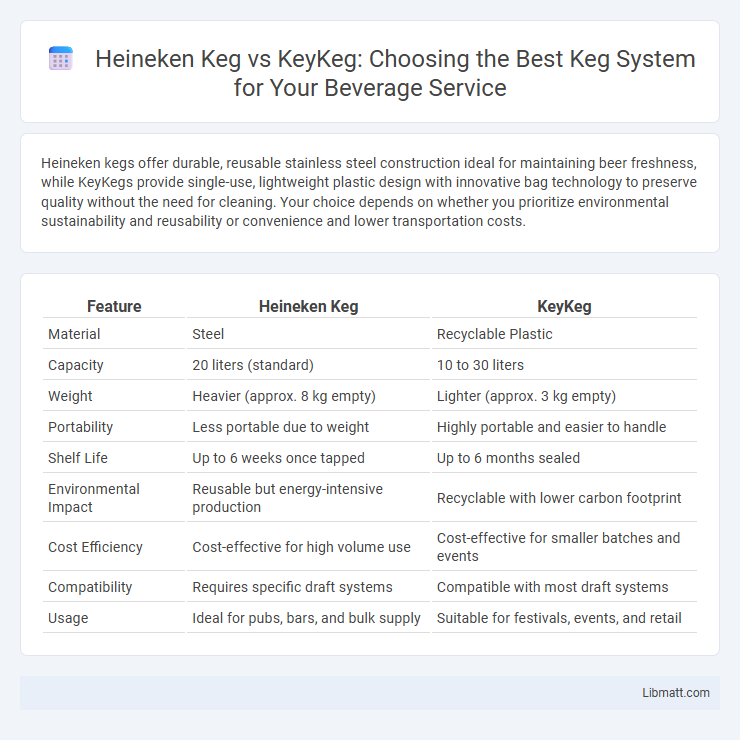Heineken kegs offer durable, reusable stainless steel construction ideal for maintaining beer freshness, while KeyKegs provide single-use, lightweight plastic design with innovative bag technology to preserve quality without the need for cleaning. Your choice depends on whether you prioritize environmental sustainability and reusability or convenience and lower transportation costs.
Table of Comparison
| Feature | Heineken Keg | KeyKeg |
|---|---|---|
| Material | Steel | Recyclable Plastic |
| Capacity | 20 liters (standard) | 10 to 30 liters |
| Weight | Heavier (approx. 8 kg empty) | Lighter (approx. 3 kg empty) |
| Portability | Less portable due to weight | Highly portable and easier to handle |
| Shelf Life | Up to 6 weeks once tapped | Up to 6 months sealed |
| Environmental Impact | Reusable but energy-intensive production | Recyclable with lower carbon footprint |
| Cost Efficiency | Cost-effective for high volume use | Cost-effective for smaller batches and events |
| Compatibility | Requires specific draft systems | Compatible with most draft systems |
| Usage | Ideal for pubs, bars, and bulk supply | Suitable for festivals, events, and retail |
Heineken Keg vs KeyKeg: Overview
Heineken Keg and KeyKeg are prominent beer packaging solutions, with Heineken Keg offering reusable stainless steel construction ideal for traditional draft systems. KeyKeg features a lightweight, single-use design with an inner collapsible liner that prevents oxygen ingress, maintaining beer freshness during transport and storage. Both types optimize beer quality retention but cater to different distribution and sustainability needs within the beverage industry.
Keg Design and Construction
Heineken kegs are traditionally made from stainless steel, offering high durability and reusability with a classic cylindrical design that ensures optimal pressure retention for draft beer systems. KeyKegs utilize a unique, lightweight plastic outer shell combined with an inner collapsible bag to maintain beer freshness without external contact, reducing oxidation and contamination risks. The innovative two-part design of KeyKegs allows for easy recycling and lower transportation weight compared to Heineken's heavier steel kegs.
Packaging and Sustainability
Heineken Kegs use traditional stainless steel, which offers durability and recyclability but requires significant resources for production and transportation due to weight. KeyKegs utilize lightweight, fully recyclable plastic with an inner liner, reducing carbon emissions during shipping and minimizing waste through single-use, eco-friendly materials. This shift in packaging highlights KeyKeg's advantage in sustainability by lowering environmental impact compared to the heavier, reusable Heineken Keg.
Dispensing Systems Compared
Heineken kegs utilize traditional stainless steel construction compatible with standard CO2 or mixed gas dispensing systems, ensuring durable pressure resistance and long shelf life. KeyKegs feature a lightweight, single-use design with a plastic inner bag, allowing for simplified dispensing using compressed air without risk of oxidation, ideal for on-demand freshness. Your choice depends on whether you prioritize the robust, reusable system of Heineken kegs or the convenience and portability offered by KeyKeg's advanced air pressure technology.
Freshness and Shelf Life
Heineken kegs use stainless steel containers that maintain beer freshness through reusable, pressurized systems, offering a shelf life of up to 90 days when stored properly. KeyKegs feature lightweight, single-use plastic bags that protect beer from oxidation and contamination, extending freshness up to 6 months with no need for internal pressurizing gas. Both systems aim to preserve flavor, but KeyKeg's inert bag technology provides superior oxygen barrier and longer shelf life for extended storage and distribution.
Ease of Use and Handling
Heineken keg features a durable stainless steel design ideal for repeated use and easy cleaning, making it suitable for high-volume establishments. KeyKeg utilizes a lightweight, single-use plastic shell with an inner bag technology that collapses as the beer is dispensed, minimizing contamination risk and simplifying handling and disposal. The portability and reduced weight of KeyKeg provide significant advantages for event setups and quick changes compared to the heavier Heineken keg.
Environmental Impact Analysis
Heineken kegs are made from traditional stainless steel, offering high durability and recyclability but require significant energy for production and cleaning processes. KeyKegs consist of a lightweight, PET plastic outer shell with an inner recycled plastic bag, reducing transportation emissions due to lower weight while generating challenges in plastic waste management. Life cycle assessments reveal KeyKegs have a smaller carbon footprint during distribution, whereas Heineken steel kegs excel in long-term reuse and circular economy benefits.
Cost Comparison
Heineken kegs generally offer a lower upfront cost compared to KeyKegs, making them a budget-friendly option for bulk beer dispensing. However, KeyKegs use recyclable plastic technology, which can reduce long-term expenses through decreased cleaning and transportation costs. Your decision should weigh initial investment against operational savings based on your keg usage frequency and environmental goals.
Availability and Compatibility
Heineken kegs are widely available through licensed distributors and offer compatibility primarily with traditional draft systems using standard Sankey couplers, making them a reliable choice for established bars and restaurants. KeyKegs feature a unique, lightweight design utilizing a plastic inner bag that collapses as beer is dispensed, enhancing portability and compatibility with both standard Sankey and D system couplers. Your choice between Heineken keg and KeyKeg depends on the specific draft equipment you have and the logistics of beer transportation and storage at your venue.
Which Keg is Right for You?
Heineken kegs are traditionally made of stainless steel, offering durability and multiple reuse cycles, making them ideal for large-scale events or bars with high turnover. KeyKegs feature a lightweight, single-use plastic design with a patented bag-in-ball system, ensuring freshness and reducing cleanup, suitable for smaller venues or craft beer distribution. Choosing the right keg depends on your priorities: Heineken kegs excel in sustainability and durability, while KeyKegs emphasize convenience and freshness.
Heineken keg vs KeyKeg Infographic

 libmatt.com
libmatt.com